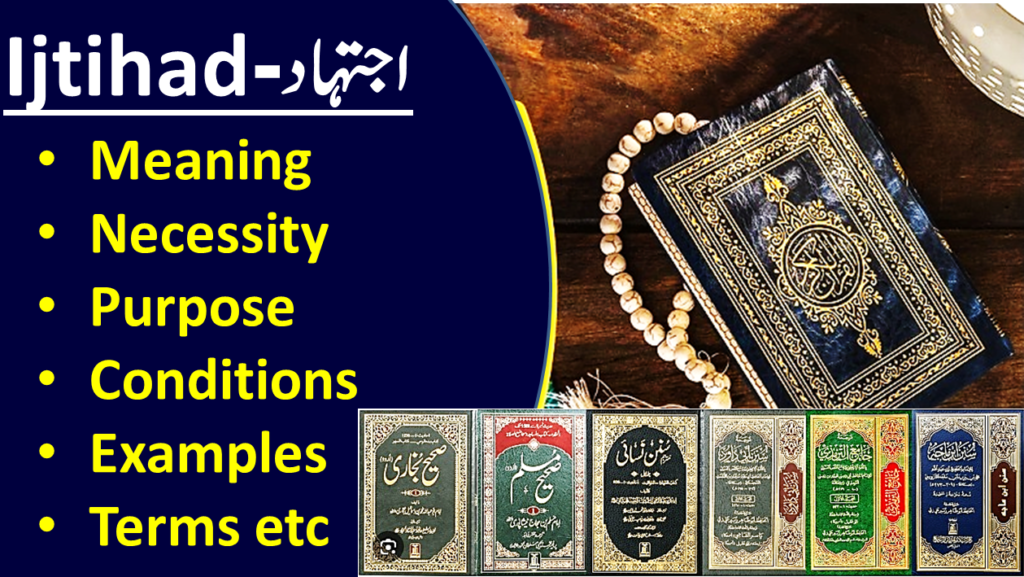
Introduction
Muslim Ummah is an ever-living Ummah and the religion Islam is true, complete code of life and fulfils the requirements all of ages. Ijtihad is a term in Islamic law that refers to the process of independent legal reasoning and interpretation. It allows scholars to derive new rulings and judgments based on the principles and sources of Islamic jurisprudence. “Ijtihad” is a legal process of Islamic jurisprudence which facilitates the new emerging issues in the light of the Holy Quran and Sunnah and interaction of the Companions (May Allah be pleased with them all) of the Holy Prophet (Peace Be Upon Him). The Muslim community is then binding to act upon as it is perceived by the Muslim scholars.
Purpose of Ijtihad
The purpose of ijtihad is to ensure that Islamic jurisprudence remains relevant and adaptable to changing times while maintaining a foundation in the Quran, Hadith (sayings and actions of the Holy Prophet Hazrat Muhammad Peace Be Upon Him), and other Islamic legal sources.
The article will cover the Following Points
- Meanings of word “Ijtihad” in Urdu and English
- Necessity and scope of “Ijtihad”.
- Conditions of “Ijtihad” in Islam.
- Terms of “Ijtihad”.
- Examples of “Ijtihad”
Literal Meaning of Ijtihad (English)
The origin of word Ijtihad is “Juhad” which means struggle, strive and hardworking. As the Holy Quran says:-
وَالَّذِيْنَ لَا يَجِدُوْنَ اِلَّا جُهْدَهُمْ
“And those who do not get any reward except their own struggle.” (Al-Tauba:79)
The aim behind Ijtihad is to put optimum efforts and energy for accomplishment of a specific job.
Meaning of Ijtihad in Urdu
اجتہاد کا لغوی معنی:
کسی کام کی انجام دہی میں تکلیف و مشقت اٹھاتے ہوئے اپنی پوری کوشش صرف کرنا۔
گویا اجتہاد اس کوشش کو کہتے ہیں جو کسی کام کی تکمیل میں مشقت برداشت کرتے ہوئے کی جائے اگر بغیر دقت اور تکلیف کے کوشش ہو گی تو اسے اجتہاد نہیں کہیں گے ۔
اجتہاد کا اصطلاحی مفہوم:
اصطلاحِ شریعت میں ’’قرآن و سنت اور اجماع کی روشنی میں مقررہ شرائط کے مطابق بطریقِ استنباط و استخراج، شرعی احکام اور قوانین کی تشکیل، تجدید، تفصیل، توسیع اور تنفیذ کے لئے ماہرانہ علمی کاوش کا نام اجتہاد ہے۔‘‘
Definitions of Ijtihad
Various definitions described by different jurists, are as under:-
Imam Ghazali. To put efforts in seeking the knowledge of Sharia orders by a Mujtahid.
Allama Taftazani. Strive by a Mujtahid for obtaining an accepted version about a particular Sharia order.
Allama Abdul Aziz. According to the scholar “Ijtihad is the peculiar effort to seek the knowledge about Sharia orders.
Necessity of Ijtihad
The necessity of Ijtihad cannot be denied at any cost. Human development is an ever-changing phenomenon. The responsibility lies with the civilization and Nations to trace the ways and means to seek solutions to emerging issues. Civilizations and Nations vanish their existence if they become static and stagnant. The Holy Quran says:-
اَلْيَوْمَ اَكْمَلْتُ لَكُمْ دِيْنَكُمْ وَاَتْمَمْتُ عَلَيْكُمْ نِعْمَتِيْ وَرَضِيْتُ لَكُمُ الْاِسْلَامَ دِيْنًا ۭ
“Today I have completed your religion for thee and I completed My blessings on you and I have chosen Islam as thee religion” (Al-Maaida:3)
Islam does not possess low vision about human life, wants to see the blooms of life to continue flourishing and puts away the obstacles which hinder development and progress for human being, and facilitates with opportunities. The new emerging issues and problems which erupt and the Holy Quran and Sunnah the Islamic Shaira’s main sources are silent on a particular matter and we do not find any clear instructions. So the ijtihad is the method which guides us to solve those issues. The companions of the Holy Prophet (Peace Be Upon Him) were trained by the Holy Prophet (Peace Be Upon Him), hence the responsibility of findings (extraction) was deposed to Islamic Ummah. Now prime obligation rests with the Muslim (Mujtahideen) intellects and scholars to ponder upon with grave research and work by ijtihad.
Ijtihad is the only way which offers the solutions for all emerging human life issues and the human lives does not come at static or standstill stage. Ijtihad is a source spring. The Islamic Ummah is blessed with the pious scholars who will keep the everlasting truth completion of Islam intact and prove the truth. Refraining the hardships from the human life, they will be striving to present the solutions of all complicated human issues of all ages according to the Holy Quran and Sunnah.
Scope of Ijtihad
There are many orders in sharia which are self-explicit like prayer, fasting, alms, pilgrimage etc. So Ijtihad is not required for such vivid Shariah orders, however the issues which erupt later on and there is no clear crystal instructions available in Quran and Sunnah, the matter will be resolved through Ijtihad. Ijtihad will be conducted in these current controversial issues.
Origination of Ijtihad
This is pursued by the Holy Quran, Hadith, actions of “Sahabah Karam” and consent of Ummah.
Order of Ijtihad
When the Muslim jurists ponder upon a special issue then that order would be liable to be obeyed by all the Muslim community.
Conditions for Ijtihad
Ijtihad becomes necessary in three conditions:-
To Seek the Shariah Order. If no clear instructions of Islamic Shariah are available about a specific issue then Ijtihad is must to seek the solution.
Ascertion of Particular Place and Time. Since Shariah orders are concise, so about particular issue then Ijtihad is essential to specify the time and space of a particular order like testimony of witness.
Evasion from hardships and complications. Ijtihad in case of any grave complication or under compulsion waives permission to the victim person in special circumstances as a permissible concession.
Terms of Ijtihad
There are fourteen essential terms and conditions which are necessary for a Mujtahid to possess like:-
- Knowledge of Quran
- Knowledge of Sunnah
- Know how about the consent of Ummah
- Proficiency in Islamic jurisprudence
- Knowledge about Fiqh ordains
- Knowledge about Arabic language
- Capability to clarify the issues
- Capability about shariah objectives
- Knowledge about principles of fiqh and theories
- Knowledge about basic tenets
- Knowledge about Ilmul Kalam and arguments
- Wisdom
- Maturity
- Balance (Justice) in solving the issues
Few Examples of Ijtihad During the Contemporary Era
1. Addressing contemporary medical ethics issues, including:
- organ transplantation
- Transfusion of Blood
- End-of-life care
- Cloning and
- The use of reproductive technologies, through the interpretation of Islamic sources
2. Financial transactions and banking practices like:
- Interest on funds of Government employees
- Islamic mortgages
- Investment funds
- Islamic microfinance etc
- Insurance policy (of Life, Vehicles etc)
3. Formulating guidelines for the use of social media and digital platforms based on Islamic principles of ethics, privacy, and responsibility.
4. Formulating guidelines for Islamic schools and educational institutions to incorporate modern teaching methodologies while adhering to Islamic values and principles.
5. Deriving rulings on the permissibility of new forms of entertainment, such as virtual reality gaming or augmented reality applications, within the boundaries of Islamic ethics and morality.
6. Applying ijtihad to determine the compatibility of emerging technologies, such as artificial intelligence, blockchain, and nanotechnology, with Islamic legal and ethical frameworks.
7. Formulating guidelines for Islamic fashion and modesty, taking into account cultural diversity and contemporary fashion trends while adhering to Islamic dress codes.
8. Criminal Laws and Punishments related to new crimes like cybercrime or terrorism
9. Few other examples of Ijtihad are:
- Use of wrist watch
- Travel by air
- Usage of Modern Technology in slaughtering animals
- Offering prayer during travelling
- Telephonic “Nikah”
- Gender-related issues
Conclusion
Being natural, futuristic, everlasting and universal religion Islam leaves no issue or matter unsolved and provides its followers with the solution to ever-rising and newly emerging issues by leaving the doors of Ijtihad open for all the times to come. This beauty of Islam keeps this religion modern for all periods of time. Muslim Ummah is everlasting having the capacity in that to absorb and adopt the required solutions according to the modern demands of the day. Allah Almighty desired to maintain this Ummah’s dynamic aspect and rejects such actions which make them stagnant or static may that one be visionary or practical.
FAQs about Ijtihad in Islam
1. What is Ijtihad?
Ijtihad is a term in Islamic law that refers to the process of independent reasoning and legal interpretation by qualified Muslim scholars. It involves the application of reasoning to derive legal rulings in areas not explicitly addressed / explained in the Quran and Hadith.
2. Who can perform Ijtihad?
Ijtihad is traditionally performed by qualified Islamic scholars who possess a deep understanding of Islamic jurisprudence and its sources. These scholars are known as mujtahids or mujtahideen.
3. What are the sources of Ijtihad?
The primary sources of Ijtihad in Islam are the Quran, the authentic Hadith (sayings and actions of the Holy Prophet Hazrat Muhammad Peace Be Upon Him), consensus (ijma) of scholars, and analogical reasoning (qiyas).
4. Is Ijtihad a mandatory practice?
Ijtihad is not mandatory for every Muslim. It is the responsibility of qualified scholars to perform Ijtihad to address new-emerging and complex issues that arise over time. However, individual Muslims are encouraged to seek guidance from knowledgeable scholars for personal matters.
5. Can Ijtihad lead to different opinions?
Yes, Ijtihad can lead to differences of opinion among scholars. Due to the nature of independent reasoning, scholars may arrive at different conclusions based on their interpretation of the available sources. Despite these minor or secodary differences, real spirit of Islam remains the same.
6. Are there any limitations to Ijtihad?
While Ijtihad allows for flexibility and adaptability in Islamic law, it is subject to certain limitations. Scholars must adhere to the principles and methodologies of Islamic jurisprudence, ensuring their rulings are consistent with the overall objectives and values of Islam. No ruling / solution, in any case, should go against the basic and agreed upon islamic teachings.
7. Can Ijtihad be applied to all aspects of life?
Ijtihad can be applied to various aspects of life, including social, economic, and political matters, as long as they fall within the realm of Islamic jurisprudence. However, some areas, such as matters explicitly addressed in the Quran and Hadith, are considered beyond the scope of Ijtihad.
8. What is the role of Ijtihad in modern times?
Ijtihad plays a crucial / significant role in addressing contemporary issues and challenges faced by Muslims. It allows for the adaptation of Islamic teachings to changing circumstances, ensuring relevance and practicality in different social and cultural contexts.
9. Are there different schools of thought regarding Ijtihad?
Yes, there are different schools of thought within Islam regarding the extent and methodology of Ijtihad. Some schools emphasize the authority of early scholars, while others promote a more flexible approach to Ijtihad.
10. How does Ijtihad contribute to the development of Islamic law?
Ijtihad is essential for the ongoing development and evolution of Islamic law. It enables scholars to address emerging issues and challenges by deriving legal rulings based on the principles and teachings of Islam. This ensures that Islamic law remains dynamic and applicable in different times and places.







